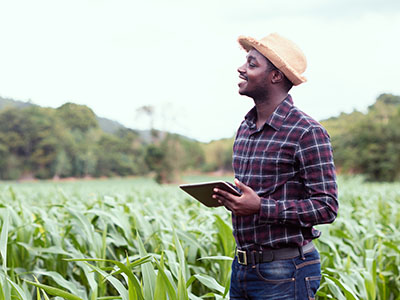Agriculture data monitoring system and tool, CropWatch, set to help developing countries tackle COVID-19 impacts and food insecurity.
Earth observation and crop monitoring on a massive scale are neither easy nor inexpensive exercises, but both are necessary for proper food security planning. Yet, many developing countries simply don’t have access to required tools, either due to technology deficits or costs.
China aims to help bridge this technology gap by offering developing countries access to its earth observation satellite system for crop monitoring, CropWatch, in partnership with United Nations Commission on Science and Technology for Development (CSTD), under the secretariat of UNCTAD.
CropWatch is a system that uses satellite data to monitor crop conditions and integrates this with other climate-related data on drought, pest and disease for better farm management.
“In a time of crisis, satellite technology can support critical decision-making and help countries shore up their food security,” said Ms. Shamika Sirimanne, CSTD secretariat head and UNCTAD technology and logistics director.

The severe locust swarms in East Africa and the Horn of Africa earlier this year, and disruptions to normal farming and the food supply chain caused by stalled trade due to the COVID-19 crisis, are two examples where better access to technology could have helped.
Closing the gap
The Chinese government are seeking to close this gap through a new three-way partnership between the Chinese Academy of Sciences (CAS), the Alliance of International Science Organizations (ANSO) and CSTD.
CropWatch has been used by China since 1998 to assesses national and global crop production, serving as an important tool in decision-making on the food market, annual planning of food import-export and disaster relief.
The technology has been deployed in several developing countries and will now be extended to more under the partnership.
It will help them monitor their crops and the system can be customized by country and region to meet specific needs.
Combating food insecurity with data
The partnership was announced at the 23rd annual meeting of the CSTD, which took place virtually for the first time this year, by Prof. Bai Chunli president of CAS and the ANSO.
During the CSTD various countries make commitments to advancing science and technology collaborations.
Mr. Bai said the coronavirus pandemic lays bare the data divide between developed and developing countries, and this impacts their ability to make good, strategic decisions about food supply.
“The COVID-19 pandemic has made us realize more than ever before, the importance of solidarity, international cooperation and the need for science and innovation in our fight against our common challenges,” Mr. Bai said.
“In the current crisis, it is important for food-insecure countries to have firsthand information on the world’s food production, both at national and global levels,” he said.
The availability and transparency of this information is a challenge, Mr. Bai noted, because the countries don’t own their own monitoring and analysis systems. “These countries must take the risk of making decisions based on information from a third party, which is either delayed or unverifiable,” he said.
The best situation is one in which countries have a monitoring and analysis system of their own. CropWatch offers this opportunity by allowing countries to carry out independent monitoring and analysis of agro-information and crop production with the application of remote sensing data.
CropWatch to help with global goals
Under the new partnership, developing countries that need CropWatch can access the technology directly and use it for earth observation and food security purposes.
Countries will be trained on the system, its underlying techniques, as well as options for customization and localization.
CropWatch is also expected to contribute towards the achievement of the sustainable development goals (SDGs) in developing countries.
“It is easy to see how the impact of an incident in one country can easily spill over into others – and food insecurity in particular threatens many nations and regions,” Ms. Sirimanne said.
She warned that without global collaboration in science and technology, many existing divides would worsen, but shared data and technology could minimize the negative impacts of this.
“We welcome this partnership to ensure that developing nations have the right tools to determine their own destiny,” she said.
This new partnership will add to a growing list of concrete cooperation initiatives in science and technology for development, delivered through the CSTD.
The list includes collaborations between UNCTAD and Brazil to deliver courses on STI for industrial policy, capacity-building on STI policies and incubator management provided by China, and trainings for young female scientists offered by the Okayama University of Japan.


